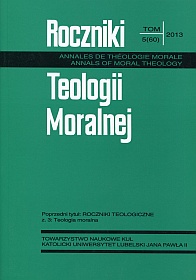Enforcement in Sexual Relations and Moral Responsibility of the Enforced
Abstract
Not infrequently marital life in its manifestations is far from its ideal. Mutual love and respect are repressed by egoism, individualism, and also by immoral demands concerning the sphere of intimate life. Such situations become a source of conflict of conscience of the person enforced to immoral intercourse. This paper focuses on two situations: 1) enforcement in the spousal intimate life and 2) defense against the results of rape on the one hand by a contraceptive (but not abortive) pill, and on the other by the „day after” pill (in the context of the discussion initiated by cardinal Joachim Meisner’s resolution in this question). Drawing on the teaching of the Church's Magisterium the author indicates a possibility to accept immoral intercourse (made infertile) in the case when a spousal is enforced, but regards acceptance of anal intercourse as unnatural for both parties. In the case of rape, the author indicates that it is morally permissible for the woman to defend herself by using a contraceptive pill (which is not abortive). At the same time he excludes the „day after” pill for reasons of its specific action.
References
Arzt muss zu verantwortungsvoller eigener Entscheidung kommen. „Strona internetowa Erzbistum Köln” 31.01.2013. Http://opencms.erzbistum-koeln.de/modules/news/news_2283.html.
Ciccone L.: „Non uccidere”. Questioni di morale della vita fisica. Milano: Edizioni Ares 1984.
Gocko J.: Pornografia jako zagubienie sensu ludzkiej cielesności i płciowości. W: Ludzka płciowość w kontekście miłości. Przesłanie moralne Kościoła. Red. J. Nagórny, M. Pokrywka. Lublin: Wyd. KUL 2005 s. 219-242.
Günthör A.: Chiamata e riposta. Una nuova teologia morale. T. 3: Morale speciale: le relazioni verso il prossimo. Roma: Edizioni Paoline 1979.
Guzzetti G. B.: Morale generale. Torino: Editrice Elle Di Ci 1990.
Häring B.: Nauka Chrystusa. Teologia moralna. T. 3: Powszechne królewskie władztwo Boga. Teologia moralna szczegółowa. Poznań: Pallottinum 1963.
Kokoszka A.: Sakramentologia moralna. Cz. III: Moralność życia małżeńskiego. Tarnów: Biblos 1997.
Memoriał krakowski. Uzasadnienie katolickiej nauki tyczącej podstaw moralnych życia małżeńskiego oraz Wprowadzenie do encykliki „Humanae vitae”. Poznań: BONAMI 2012.
Merkelbach B. H.: Summa theologiae moralis ad mentem D. Thomae et ad normam iuris novi. T. 3: De Sacramentis. Brugis: Desclée de Brouwer 1962.
Olejnik S.: Dar − wezwanie − odpowiedź. Teologia moralna. T. 7: Moralność życia społecznego. Warszawa: ATK 1993.
Olejnik S.: W odpowiedzi na dar i powołanie Boże. Zarys teologii moralnej. Warszawa: ATK 1979.
Perico G.: Sturpo, aborto e anticoncezionali. „La Civiltà Cattolica” 1993 nr 3(3433) s.37-46.
Prümmer D. M.: Manuale theologiae moralis secundum principia S. Thomae Aquinatis in usum scholarum. T. 3. Friburgi Brisgoviae-Barcinone: Herder 195512.
Pucci F.: Meditate risposte di tre teologi su un tema scabroso. „La Stampa Sera” 1961 nr299 s. 9.
Rossi L. Carità. W: Dizionario enciclopedico di teologia morale. Red. L. Rossi, A. Valsecchi. Roma: Edizioni Paoline 1976(4) s. 89-100.
Speciale A.: „I vescovi tedeschi sulla pillola? Decisione ineccepibile”. Intervista al presidente della Pontificia Accademia della Vita. „Strona internetowa Vatican Insider”. 20.03.2013. Http://vaticaninsider.lastampa.it/inchieste-ed-interviste/dettaglio-articolo/articolo/pillola-chiesa-church-iglesia-carrasco-22574/.
Tettamanzi D.: Bioetica. Nuove frontiere per l'uomo. Casale Monferrato: Edizioni Piemme S.p.A. 1990.
Wojtyła K.: Komentarz teologiczno-duszpasterski do Humanae vitae. Rzym: Centralny Ośrodek Duszpasterstwa Emigracji 1969.
Wróbel J.: Czy obronimy katolicką naukę o moralności małżeńskiej? Refleksje nad aktualnością przesłania encykliki „Humanae vitae” w czterdziestą rocznicę jej ogłoszenia. „Teologia i Moralność” 2008 t. 4 s.81-105.
Wychowanie seksualne w rodzinie i szkole. Red. K. Glombik. Opole: Redakcja Wydawnictw Wydziału Teologicznego Uniwersytetu Opolskiego 2010.

